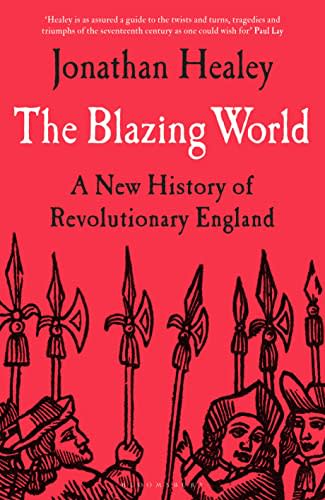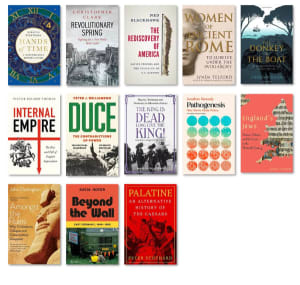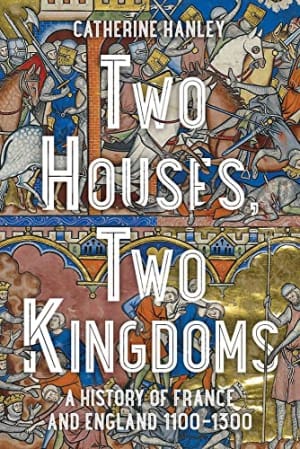This is an enjoyable and easy read, with a breezy tone throughout. The author, an historian at Kellogg College, Oxford, has his own website https://thesocialhistorian.wordpress.com/, described as 'part scholarship, part satire', which is consistent with the style of the book. It is worth a visit. On the evidence of this book, the author has a successful career ahead of him as a populariser of early modern British history.
England: Blazing World and Devil Land
Comparisons will be drawn between this book and Devil Land, a book by Dr Clare Jackson which won the Wolfson History Prize in 2022.1 Both cover the same period and have titles which imply a similar underlying idea (i.e., that seventeenth century England was a mess). However, they approach the topic from different perspectives: Clare Jackson's book draws on foreign diplomatic correspondence and thereby provides a fascinating insight into how seventeenth century England was viewed by outsiders; as a result, the focus is mainly on politics and foreign affairs. In contrast, Jonathan Healey's specialism is social and economic history, and, in my opinion, his book provides the more rounded assessment of not only happened, but what things were like at the time. They are excellent books, and I would recommend reading both without fear of excessive repetition.
You're not the boss of me (or perhaps you are …)
In the seventeenth century, the English were struggling to work out how they wanted to be governed, experimenting with different forms of government ranging from royal absolutism to republicanism (with differing degrees of popular representation discussed and tried), finally settling on a type of constitutionally constrained monarchy which was the progenitor of our own current system of government. If all this political toing and froing sounds familiar, I suspect that is the point. Both Clare Jackson and Jonathan Healey avoid the temptation to be too heavy handed with drawing modern parallels, but the subtext is clear – Britain may feel like a mess now, but we've been here before (in the case of the seventeenth century, with a relatively happy ending).
She did reflect on the Bible
Of the two, Jonathan Healey is a little less shy about throwing in the occasional modern reference point or buzz phrase, for example in presenting the religious conflicts of this period as a 'culture war' pitting Puritan killjoys against fun loving cavaliers. This type of modern referencing can be irritating (the implication presumably being that history needs to be made relevant to modern readers for them to bother with it) but in this case it struck me as a fairish comparison to make. I did enjoy the fact the Puritans got quite so hot under the collar about the Book of Sports (declarations by James I and Charles I that people were allowed to have fun on Sundays) – it's satisfying when people from the past live up to stereotypes, and I couldn't help feeling that the Puritans didn't do a lot to help their eventual reputations.2
The Whigs strike back
To the extent there is any overarching theme emerging from the book, it is that the Civil War wasn't just about religion – people were also motivated by deeply held beliefs about the constitution and the accountability of those in power to those they ruled. In that sense, the book is a subtle nod towards the original Whig interpretation of events in seventeenth century England (but with due regard given to the importance of religion). One thing I took from this book was how ideas that were quite radical for the time (such as suffrage for all adult males, or something close to it) were discussed and taken seriously (by some within the Parliamentarian side) during the Civil War (for example, at the Putney Debates of 1647).
Dross and dung
However, constitutional niceties clearly weren't the primary motivator for all participants in the Civil War: Cromwell, for example, described constitutions as mere 'dross and dung' in comparison with Christ. The author speculates that post-Civil War England might have taken a different direction under the stewardship of a more constitutionally minded leader such as John Lambert, who he describes as a 'constitutional genius' (an interesting judgment on someone who came up with a constitution which failed).
Things can only get better
Another slightly Whigish characteristic of this book is that, in Jonathan Healey's telling, the story of seventeenth century England is, broadly speaking, a story of progress. We entered the century a land of witchcraft trials, frequent executions, and famine; we ended it with all of these in sharp decline, and a pattern of economic growth and specialisation that foreshadow the later industrial revolution.
Bottoms and farts
The book is fun and easy to read – it's a page turner. The author clearly enjoys recounting an amusing/shocking anecdote or quote and his tone throughout is irreverent and breezy. The first chapter opens immediately with a mock wedding between two men; elsewhere, we are told of the use of canon law to prosecute a Suffolk man for farting in church; later we are presented with a bishop who 'literally shat himself' whilst fleeing from an irate Puritan. In the acknowledgements, the author thanks his agent for recommending '20% less bottoms and farts', which made me curious what his original draft read like – perhaps a bit like a Carry On version of seventeenth century English history.
Pre-destined to success
If I had a minor criticism of the book, it is that some of the analysis might have benefited from more fleshing out. In some cases, casual links and conclusions are drawn without a great deal of explanation. We are told that the so-called 'middling sort' (i.e., yeomen and lesser gentry) were drawn to Puritanism because its theology of pre-destination fitted with their own experience of worldly success3. Elsewhere, the idea of Royal absolutism is described as a 'reaction' to the idea that monarchs were accountable to those they ruled. Over two paragraphs, a series of casual connections are made connecting economic change to a more widespread belief in common law civil liberties: as economic growth outpaced the growth of the money supply, credit became more commonplace; that resulted in greater litigation in relation to unpaid debt, and that 'in a culture so saturated with lawyers and litigants, legal ideas inevitably seeped into politics', including ideas about civil liberties.4 To be fair to the author, they are all interesting ideas worth considering, and there may be a lot of research and thought underlying them. But they are dealt with in a cursory fashion in the book, whilst appearing to justify closer inspection.
Conclusion
Unlike Clare Jackson's book, with its focuses on politics and foreign affairs, the Blazing World is broader in its approach: at its core is still a relatively standard narrative history of the key political and military events; but this is interspersed with analysis of English society and economics which gives a good sense of what England was like at the time and how that impacted on politics. In my opinion, it's this social and economic analysis which are by far the most interesting parts of the book, and I'd happily read more by the same author on those subjects.
I read Devil Land last year and thought it was excellent (I would have given it four stars out of five, the same as this book review) but didn't review it at the time as I was a bit occupied with other things (moving house). ↩︎
I have a bit of an axe to grind with the Puritans myself as one of my first tasks as university was to read the diaries of a seventeenth century Puritan lady – she (and her unlucky servants) spent every day in the same way – they prayed a lot; they did reflect on the Bible; and did converse on the Bible. Occasionally, she saw her husband and did the same. I got halfway through before giving up, concluding that I could reasonably guess the remainder (my tutor, Dr Gunn, assured me that I missed out on the exciting bits, although he never told me what they were). ↩︎
The book states that between the mid-sixteenth century and the second quarter of the seventeenth century, the yeomen saw their wealth rise fourteenfold, which I found remarkable. ↩︎
Donald Trump appears to have had plenty of experience of the American legal system without it improving his regard for the country's constitution. ↩︎
Book details
(back to top)- Title -
The Blazing World : A New History of Revolutionary England
- Author -
Jonathan Healey
- Publication date -
February 2023
- Publisher -
Bloomsbury Publishing
- Pages -
512
- ISBN 13 -
978-1526621658
- Podcast episode -
The Bunker: Oliver’s Army Can Revolutionary England explain our modern mess?
- Podcast episode -
- Amazon UK -
- Amazon US -



